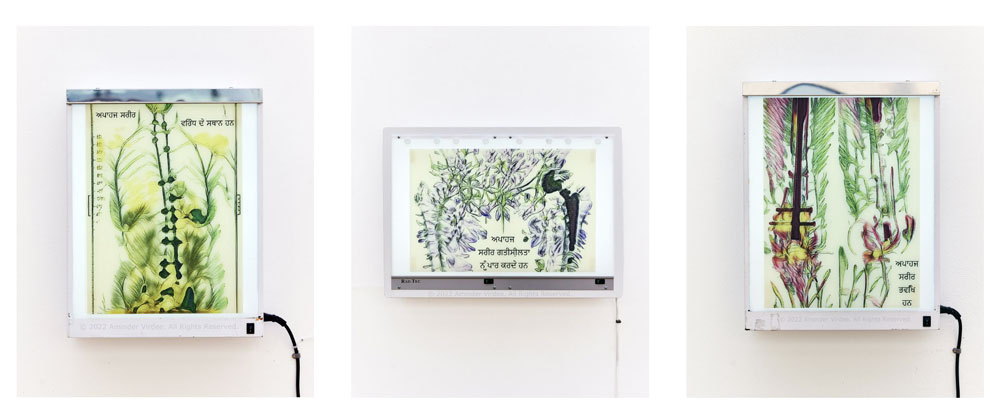Award category:
Aminder Virdee is a South Asian transdisciplinary artist, creative justice and arts facilitator, writer, filmmaker, and consultant. From 2019 to 2024, she was a Trustee for Attitude is Everything, the UK’s leading disability-led organisation focused on live music accessibility. In this role, Virdee championed intersectional change, introducing trauma-informed mental health practices and safeguarding policies for staff, participants, and audiences, focusing on amplifying Black and Brown-disabled voices in the arts.
Virdee’s artistic practice is informed by intersectionality, autoethnography, disability justice, crip technoscience, decolonisation, and magical realism. Her work centres on creative acts of
justice—reclamation, resistance, and cross-movement solidarity—rooted in her quadruple-marginalised identity and the collective experiences of the communities she intersects. Virdee’s artistic practice is informed by intersectionality, autoethnography, disability justice, crip technoscience, decolonisation, and magical realism. Her work centres on creative acts of justice—specifically reclamation, resistance, and cross-movement solidarity—rooted in her quadruple-marginalised identity and the collective experiences of the communities she intersects. Her transdisciplinary approach blends art forms, materials, media, STEM practices, and theories. This adaptable, kaleidoscopic methodology serves as an accessible tool for re-worlding and dismantling oppressive norms through art.
Virdee’s work has been exhibited, screened, and performed internationally, including at National Gallery X—where she was described as “one of the most underrepresented radical artists of our time”—TATE Exchange at TATE Modern, Ars Electronica, European Film Festival, Lyric Theatre Hammersmith, Culture Hub New York and the Attenborough Art Centre. In 2023, she received Arts Council England’s ‘Developing Your Creative Practice’ grant, which she has postponed until 2025 due to health reasons. Her audiovisual work, “KaleidoSkeleton Ti: The Desi Cyborg” (2020–21), was showcased at the European Film Festival and described by the British Film Institute’s Sight and Sound magazine as one of the “most moving experimental works” of 2021.
As a writer, Virdee has contributed articles for Disability Arts Online and authored the paper ‘Staring Back: Hacking Intersectional Oppression through Eco-Crip: Cybotanical Futures’, published in the prestigious Leonardo journal (Volume 57, Issue 2) by MIT Press, a leading international journal on arts, science, and technology.
Virdee is the creator, co-writer, lived experience and inclusion consultant, and director’s attachment for the short film ‘My Eyes Are Up Here’ (2022), based on a day in Virdee’s life when she was 19. Funded by the BBC and BFI, and starring Jillian Mercado, the film has been featured in over 20 prestigious international film festivals, including the BFI London Film Festival 2022, London Short Film Festival 2023, Tribeca Film Festival 2023 (NYC), and Sundance Film Festival 2023. Virdee and her team received multiple awards, including the “Woman’s Voice Award” and “Best of the Festival Award” at the BIFA-qualifying Beeston Film Festival in 2023. In late 2023, Virdee was awarded the title of ‘Film London Lodestar’, an honour celebrating and amplifying London-based creatives, filmmakers, and craftspeople who are expected to lead the creative industry in the future.
Virdee’s consultancy and activism work spans 17 years across the arts, media, film, publishing, and other sectors. Beginning at 18 as a London Ambassador for the Muscular Dystrophy Campaign’s Trailblazer Network, she was recognised with the Merrill Lynch Local Hero Neighbourhood Excellence Initiative Award in 2012 for her leadership in disability campaigns, her role as chair of regional and APPG meetings and as a media spokesperson. As an arts professional and panel speaker, Virdee has shared her lived experience and insights on art and justice at events hosted by institutions such as the National Gallery.
Passionate about intersectional social and disability justice, Virdee frequently speaks at panels and seminars, addressing disability justice, diversity, and equity, and developing strategies for authentic inclusion. She has consulted on disability representation and imagery in schools, boards, seminars, and events, including the London Book Fair and Royal Holloway University for Disabled Students UK. Her contributions extend to children’s literature, including Max the Champion (2013) with Inclusive Minds UK.
Virdee furthered her advocacy by founding DIVA (Disabled Intersectional Voices in the Arts), a disabled, neurodivergent, Black and Brown-led network dedicated generating sites of creative justice, artivism, resistance, and community connection against institutional and systemic intersectional discrimination, specifically ableism. She also one of the founding members of CripJoy, a transnational, majority-BIPOC community of practice re-worlding mental health through an intersectional, anti-ableist, and anti-sanist lens (other founding members: Sulaiman R. Khan and Josh A. Halstead).
From 2016 to 2019, Virdee served as an Arts Educator at Cranford Community College through the National Saturday Arts and Design Club (based at Somerset House, London, and founded by Sir and Lady Sorrell). She curated art curricula for students aged 13–16, introduced innovative teaching methods to enhance understanding, guided students through sustainable strategies towards a career in the arts, used art as a medium to explore politics and diversity, and led gallery visits, events, and masterclasses, including a behind-the-scenes session at the English National Opera.

Disability Power 100 profile information is self-submitted by the profile subject. Shaw Trust understands and respects that disability and impairment descriptors and language use varies from person to person. Shaw Trust assumes no responsibility or liability for any errors or discrepancies in the content of this, or any other, profile page.